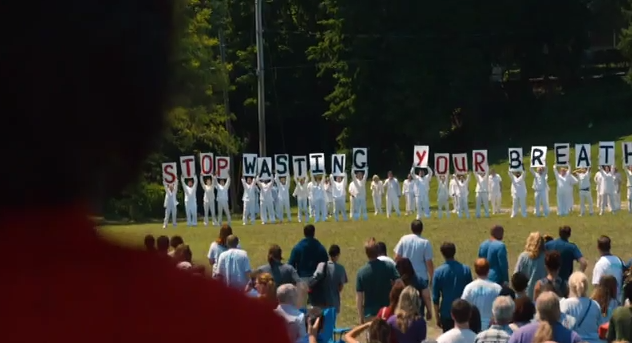 There has probably never been a pilot episode for a new series as glum, anguished and depressing as that of tonight’s “The Leftovers” (HBO, 10 p.m.) the new series in part from Damon Lindelof of “Lost” about the aftermath of a strange global event — the sudden disappearance of 2 percent of the people.
There has probably never been a pilot episode for a new series as glum, anguished and depressing as that of tonight’s “The Leftovers” (HBO, 10 p.m.) the new series in part from Damon Lindelof of “Lost” about the aftermath of a strange global event — the sudden disappearance of 2 percent of the people.
Was it the rapture? Hand of God? Something else? Nobody knows and three years after the event, people are still gnashing teeth, smashing fists through walls, yelling in tortured agony, abusing themselves, joining cults and shooting stray dogs. There’s nary a glimmer of hope in the grim scenario of Mapleton, N.Y. and yet the book on which it was based, by Tom Perrotta, had some of the same occasional humor and lighter touch that has been a mark of his other books that include “Election” and “Little Children” (both made into major films).
Of course as a writer he can include the inner dialogue of characters who, in the series, don’t speak at all, particularly the Guilty Remnant, the chain-smoking cult joined by Amy Brenneman.
Speaking to Perrotta in Los Angeles earlier this year, I told him I thought the first episode of the series, of which he is a co-executive producer, was pretty brutal and wondered whether it would have ever some signs of uplift, as did the book.
“Well,” he said, “I think we needed to establish, you know, what a traumatic situation the characters are living in, and I think we’re going to explore all the aspects of their lives, and I think there’s going to be a whole spectrum of emotions.”
The book, released in 2011, brought to mind the trauma of 9/11 and its aftermath, then marking its 10th anniversary.
“It was definitely on my mind,” Perrotta says, “but in a funny way, because I was thinking, you know, about the days right after 9/11 in a sense we all had that nothing would ever be the same. And then maybe five or six years later, some sense that the change had been a lot more limited than we had imagined, that in many ways our lives were unchanged by this cataclysm. And I started to just think about telling a story that explored that idea of, you know, a huge collective trauma and the various ways that a community deals with it.”
In that sense, there may never be an explanation of the mass disappearance, something that the millions who watched “Lost” may have been seeking in six seasons of that show, Lindelof says.
I’m sure that there will be people who say that they don’t like it and it’s just way too depressing and intense and confusing and other people who were completely and totally captivated by it,” Lindelof says. “And I think that, by the time you’ve seen the first three or four episodes, you’ll get a much better sense of what the series is going to be.”
Indeed, having seen three additional episodes, I can say it settles down more into the patterns of early seasons of “Lost,” by focusing on individual characters each week, in part by use of flashback, and resolving single stories before moving on to the next week.
“I do feel like we’re not just doing the pilot over and over again,” Lindelof says. “There was a question earlier about whether the show is going to be uplifting. I think one of the great things that Tom does in his writing is he finds humor in very surprising places and never makes it feel forced. And I think that the show is starting to demonstrate that to us as writers.”
An interview I did with Amy Brenneman about her role in “The Leftovers” appears here.